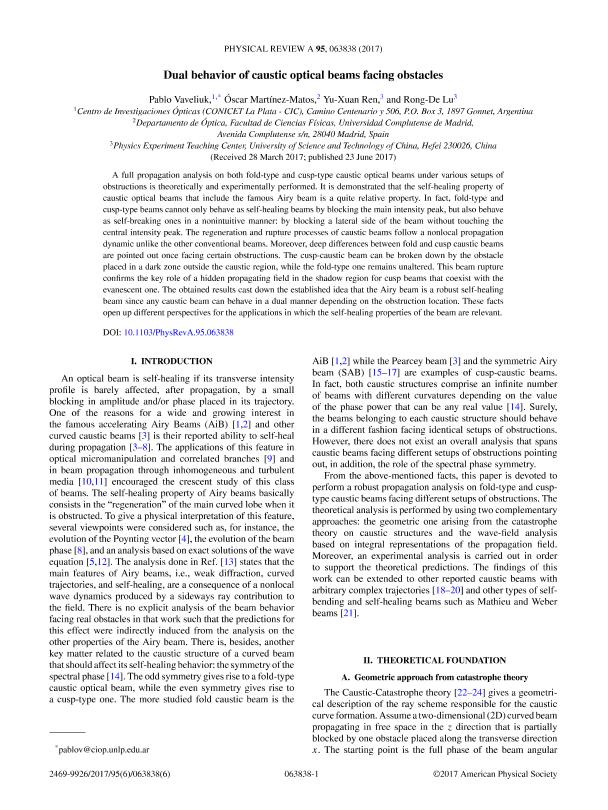Mostrar el registro sencillo del ítem
dc.contributor.author
Vaveliuk, Pablo

dc.contributor.author
Martínez Matos, Óscar
dc.contributor.author
Ren, Yu-Xuan
dc.contributor.author
Lu, Rong- e
dc.date.available
2018-06-19T19:18:23Z
dc.date.issued
2017-06
dc.identifier.citation
Vaveliuk, Pablo; Martínez Matos, Óscar; Ren, Yu-Xuan; Lu, Rong- e; Dual behavior of caustic optical beams facing obstacles; American Physical Society; Physical Review A; 95; 6; 6-2017; 0638381-0638386
dc.identifier.issn
2469-9926
dc.identifier.uri
http://hdl.handle.net/11336/49405
dc.description.abstract
A full propagation analysis on both fold-type and cusp-type caustic optical beams under various setups of obstructions is theoretically and experimentally performed. It is demonstrated that the self-healing property of caustic optical beams that include the famous Airy beam is a quite relative property. In fact, fold-type and cusp-type beams cannot only behave as self-healing beams by blocking the main intensity peak, but also behave as self-breaking ones in a nonintuitive manner: by blocking a lateral side of the beam without touching the central intensity peak. The regeneration and rupture processes of caustic beams follow a nonlocal propagation dynamic unlike the other conventional beams. Moreover, deep differences between fold and cusp caustic beams are pointed out once facing certain obstructions. The cusp-caustic beam can be broken down by the obstacle placed in a dark zone outside the caustic region, while the fold-type one remains unaltered. This beam rupture confirms the key role of a hidden propagating field in the shadow region for cusp beams that coexist with the evanescent one. The obtained results cast down the established idea that the Airy beam is a robust self-healing beam since any caustic beam can behave in a dual manner depending on the obstruction location. These facts open up different perspectives for the applications in which the self-healing properties of the beam are relevant.
dc.format
application/pdf
dc.language.iso
eng
dc.publisher
American Physical Society

dc.rights
info:eu-repo/semantics/openAccess
dc.rights.uri
https://creativecommons.org/licenses/by-nc-sa/2.5/ar/
dc.subject
Caustic Beams
dc.subject
Laser of Curve Beams
dc.subject
Beam Shaping
dc.subject
Nonsingular Geometrical Optics
dc.subject.classification
Astronomía

dc.subject.classification
Ciencias Físicas

dc.subject.classification
CIENCIAS NATURALES Y EXACTAS

dc.title
Dual behavior of caustic optical beams facing obstacles
dc.type
info:eu-repo/semantics/article
dc.type
info:ar-repo/semantics/artículo
dc.type
info:eu-repo/semantics/publishedVersion
dc.date.updated
2018-06-18T21:36:05Z
dc.journal.volume
95
dc.journal.number
6
dc.journal.pagination
0638381-0638386
dc.journal.pais
Estados Unidos

dc.journal.ciudad
College Park
dc.description.fil
Fil: Vaveliuk, Pablo. Consejo Nacional de Investigaciones Científicas y Técnicas. Centro Científico Tecnológico Conicet - La Plata. Centro de Investigaciones Ópticas. Provincia de Buenos Aires. Gobernación. Comisión de Investigaciones Científicas. Centro de Investigaciones Ópticas. Universidad Nacional de La Plata. Centro de Investigaciones Ópticas; Argentina
dc.description.fil
Fil: Martínez Matos, Óscar. Universidad Complutense de Madrid; España
dc.description.fil
Fil: Ren, Yu-Xuan. University of Science and Technology of China; China
dc.description.fil
Fil: Lu, Rong- e. University of Science and Technology of China; China
dc.journal.title
Physical Review A
dc.relation.alternativeid
info:eu-repo/semantics/altIdentifier/doi/https://dx.doi.org/10.1103/PhysRevA.95.063838
dc.relation.alternativeid
info:eu-repo/semantics/altIdentifier/url/https://journals.aps.org/pra/abstract/10.1103/PhysRevA.95.063838
Archivos asociados
